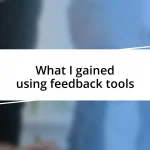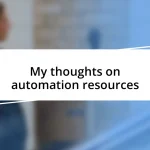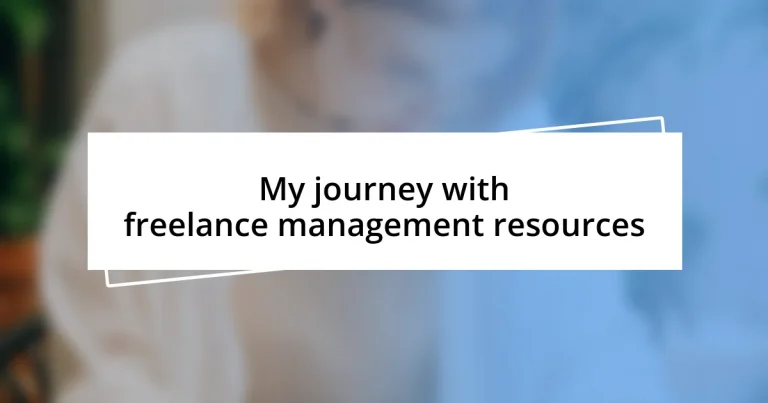Key takeaways:
- Freelance management tools like Trello, Asana, and Harvest significantly enhance organization and productivity, allowing freelancers to focus on creative work.
- Establishing effective workflows and consistent routines is crucial for managing projects and maintaining client relationships, resulting in improved communication and trust.
- Continuous learning through online courses, community forums, and podcasts enriches freelance skills and encourages personal growth, leading to better client interactions and business outcomes.
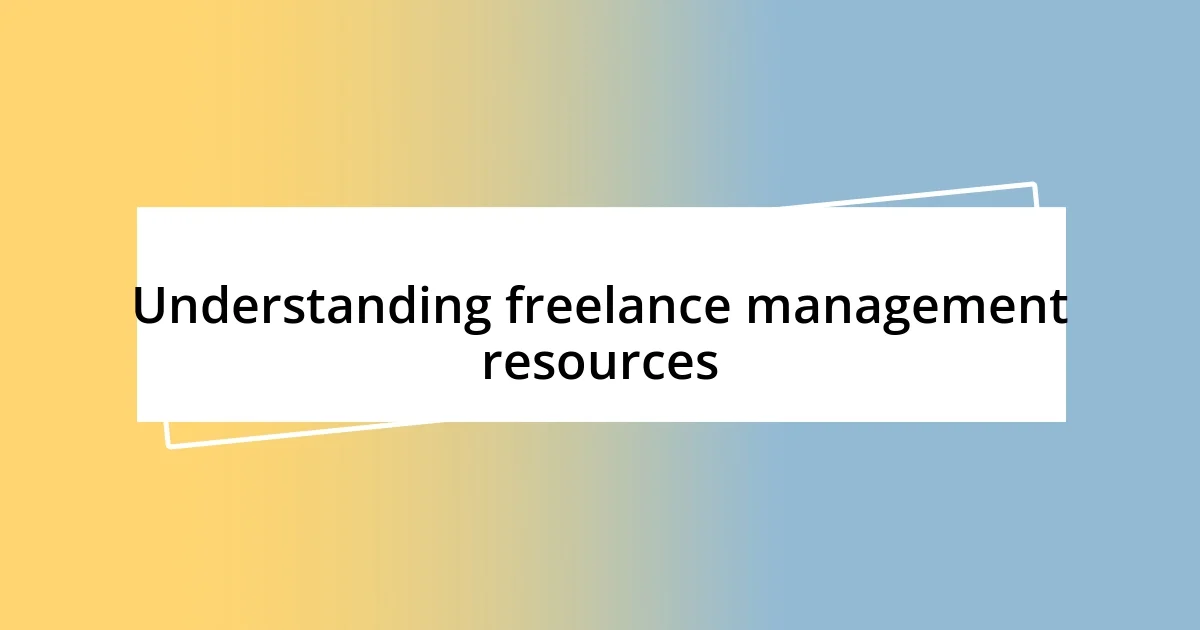
Understanding freelance management resources
Freelance management resources are tools and platforms designed to streamline the complex relationship between freelancers and clients. I remember when I first started freelancing; juggling contracts, payments, and deadlines felt overwhelming. How was I supposed to keep everything organized without dropping the ball? That was when I discovered management tools like Trello and Asana, which transformed my chaotic workflow into a more structured approach.
Understanding these resources means grasping their features and how they can cater to specific needs. For instance, some platforms focus on time tracking while others offer invoicing solutions. I often find myself evaluating which tool best suits my workflow. This not only saves precious time but also enhances my productivity, allowing me to focus on the creative aspects of my projects, instead of getting mired in administrative tasks.
Another essential aspect is the community and support that often accompanies these resources. When I encountered a tricky issue with a client, the forums and help sections proved invaluable. It’s comforting to know that there’s a network of experienced freelancers ready to share insights. So, aren’t we lucky to have such rich resources at our fingertips, making the freelance journey much more manageable?
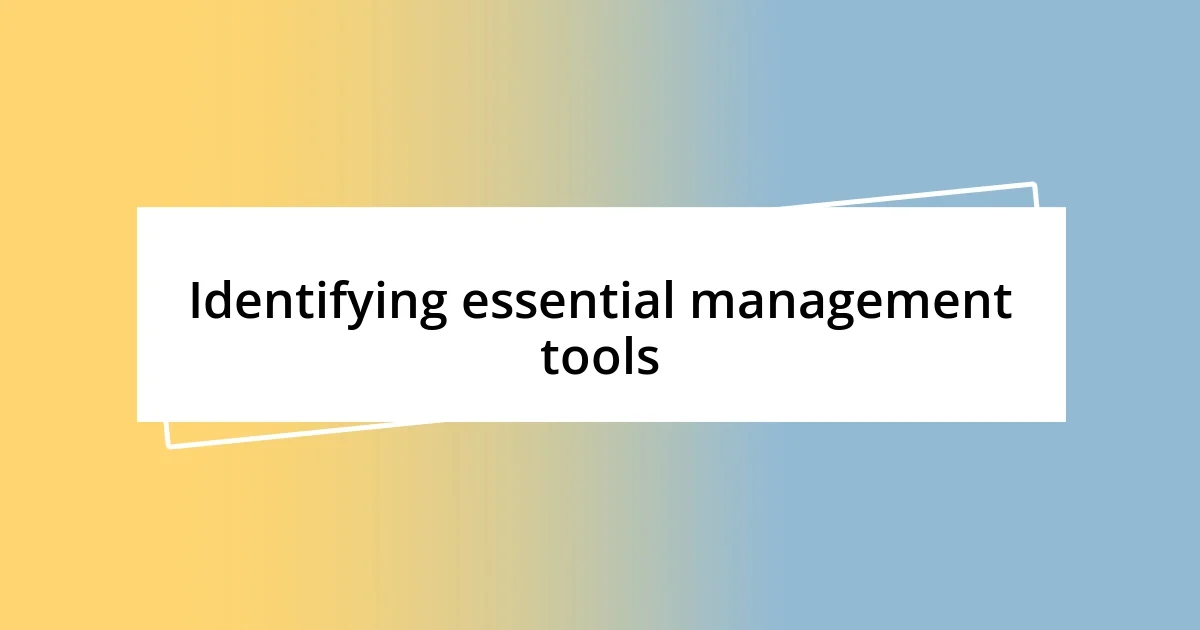
Identifying essential management tools
Identifying the right management tools can significantly influence your freelancing experience. Early in my freelancer journey, I experimented with various platforms, feeling a mix of excitement and uncertainty. Remembering how much effort I needed just to keep track of my projects, a well-chosen tool made all the difference. I didn’t just want something functional; I craved a tool that resonated with my workflow and could flexibly adapt as my needs evolved.
Here are some essential management tools that have been game-changers for me:
- Trello: Perfect for visual thinkers, it allows you to create boards for different projects, making everything feel organized at a glance.
- Asana: An excellent tool for tracking deadlines and managing tasks; it ensures nothing slips through the cracks.
- Harvest: A time-tracking tool that helps you understand where your hours go, keeping your billing transparent and efficient.
- Slack: Essential for communication, I love how it connects me with clients and collaborators without overwhelming my email inbox.
- FreshBooks: This invoicing software makes billing a breeze, letting me focus more on my work rather than payments.
Throughout my experience, I’ve learned that not all tools fit every freelancer’s style. It’s about finding what resonates with you. For instance, while I thrived with the visual layout of Trello, a friend swears by Asana’s task management capabilities. Exploring these options is worth the time investment—it ultimately streamlines your workflow and elevates your freelancing game.
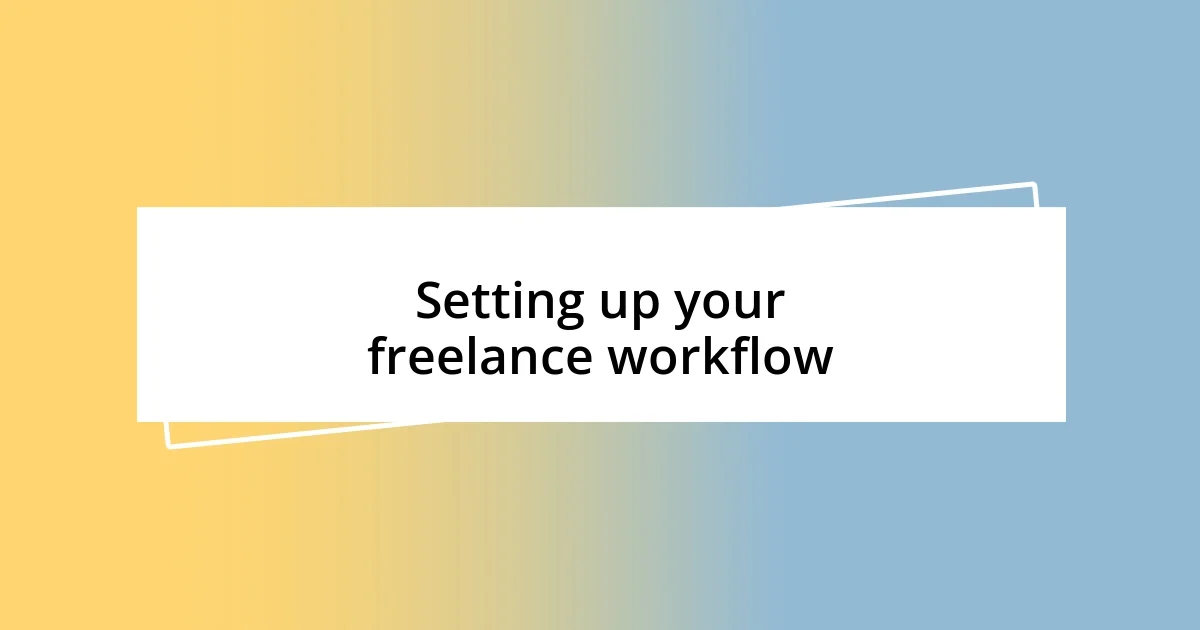
Setting up your freelance workflow
Setting up an effective freelance workflow is crucial for maintaining organization and productivity. I vividly recall the early days of my freelance career when I struggled with managing multiple projects at once. The turning point came when I deliberately designed a workflow that matched my unique style. This included prioritizing tasks, scheduling work sessions, and customizing tools that aligned with my needs. By taking these steps, I transformed that initial chaos into a smooth, manageable operation.
One key component of establishing a workflow is using a combination of tools that harmoniously fit together. I found that pairing a project management tool like Trello with a time tracker like Harvest allowed for seamless project oversight and accountability. For example, while I managed my tasks visually on Trello, Harvest kept me in tune with my productivity levels, giving me insights I never had before. Have you ever felt like some days were more productive than others without clear reasons? That’s what made these tools essential—they helped me quantify my time spent, leading to better decision-making.
Consistency in your workflow is just as important as the tools you choose. I remember the dread that came with inconsistent routines; setting specific hours worked wonders for my focus. Carving out dedicated time not only helped in task completion but also built a rhythm that I could depend on. This approach made the pitch and the follow-up feel less daunting, allowing me to foster lasting relationships with clients. Over time, I understood that establishing a flow isn’t a one-off task, but rather a journey of continuous improvement.
| Tool | Function |
|---|---|
| Trello | Visual project management |
| Asana | Task tracking and deadlines |
| Harvest | Time tracking for billing |
| Slack | Team communication |
| FreshBooks | Invoicing and payments |
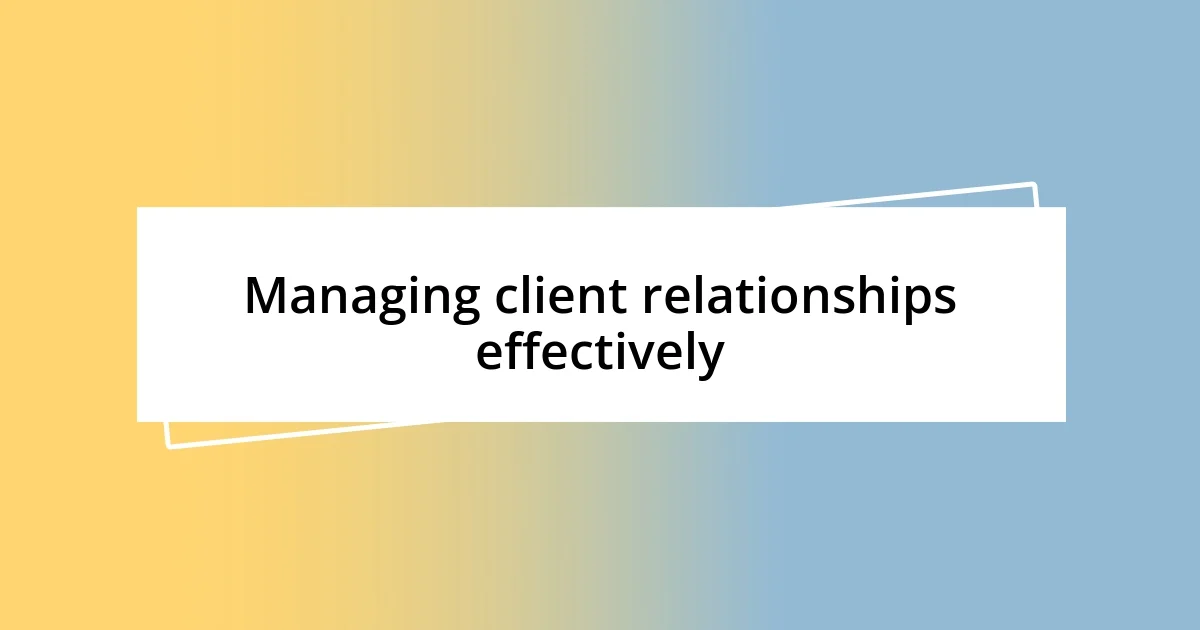
Managing client relationships effectively
Building and managing strong client relationships has been one of the most rewarding aspects of my freelance journey. I remember the early days when miscommunication often led to stress and disappointment. By actively practicing transparent communication, I discovered that setting clear expectations and regularly updating clients about project progress not only alleviated misunderstandings but also fostered trust. Have you ever had a client express appreciation simply because you kept them in the loop? It’s amazing how a few updates can strengthen the bond.
I also realized the significance of personal touches in client interactions. Sending a quick thank-you note after project completion or checking in on a client’s upcoming needs helped create an emotional connection. I recall one client who seemed impressed when I remembered their birthday; that small gesture turned a business relationship into a genuine partnership. It’s these moments that remind us that we aren’t just freelancers delivering tasks; we’re people engaging with other people.
Lastly, flexibility can’t be overstated in effective client management. I once had a client who changed the project scope midway through. Instead of panicking, I chose to embrace the change, collaborated closely to redefine objectives, and adjusted timelines accordingly. This willingness to adapt not only salvaged the project but elevated my client’s trust in me. Have you faced similar situations? Embracing flexibility can turn potential setbacks into opportunities for growth, ultimately leading to deeper, more meaningful client relationships.
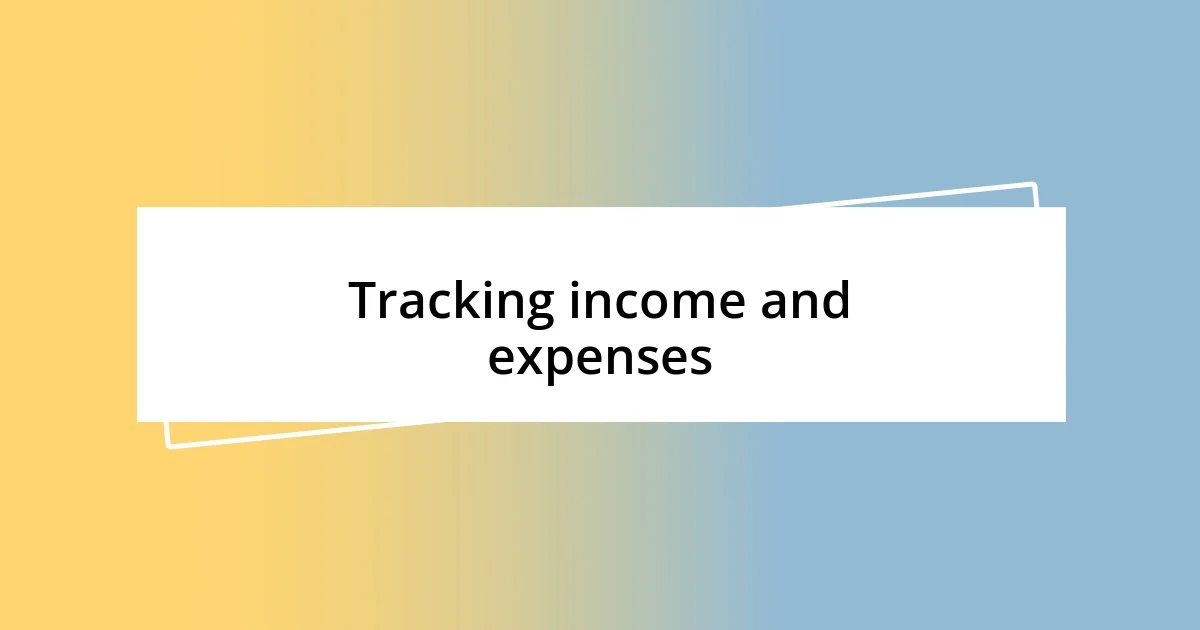
Tracking income and expenses
I’ve learned the hard way that tracking income and expenses is essential for a successful freelance career. In the beginning, I often lost track of which client had paid me and which invoices were overdue. That’s when I started keeping a detailed spreadsheet. It seemed tedious at first, but now it’s my financial lifeline. Am I the only one who felt overwhelm when dealing with finances? Trust me, a well-organized system can save you from that chaos.
One strategy I adopted is categorizing my expenses. I realized that simply noting down what I spent wasn’t enough; it was crucial to see how much I was investing in different areas, like marketing or software tools. For instance, I used to think of my subscription to design software as just another bill, until I compared it against the income generated from projects using that software. The clarity was eye-opening! Understanding these financial patterns gave me confidence in making future business decisions.
On the income side, I noticed a correlation between my invoicing habits and my cash flow. Early on, I wouldn’t send invoices until weeks after a job was completed, and it led to financial strain. Now, I invoice immediately after completing a project. Have you ever experienced a cash crunch that left you stressed out? Changing my invoicing habit not only improved my cash flow but also reinforced a sense of professionalism that my clients appreciated. It’s amazing how these simple adjustments can create a more secure financial foundation for your freelance life.
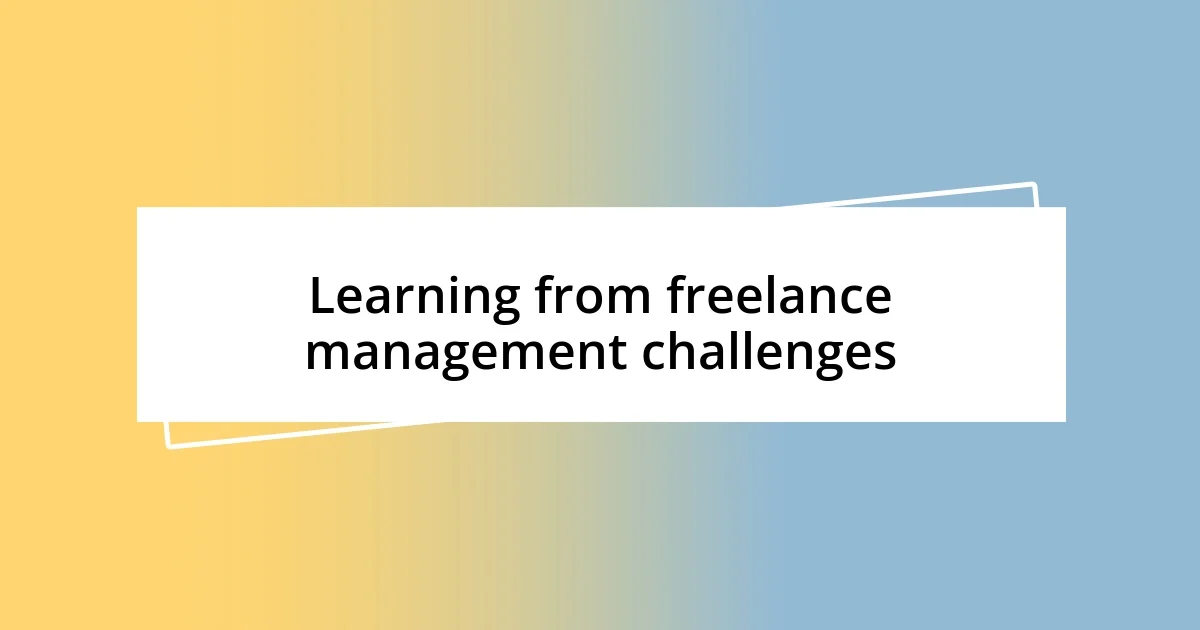
Learning from freelance management challenges
It’s fascinating how challenges in freelance management can serve as powerful teachers. One of my struggles was managing multiple projects simultaneously. I vividly remember a time when I felt completely overwhelmed during a busy season. I realized that I needed a method to prioritize tasks effectively. So, I started using a project management tool that allowed me to visualize deadlines. The relief was palpable! Have you ever felt the weight lift off your shoulders when you finally found a way to organize your workload? That’s how I felt, and it transformed my approach to freelance work.
On another occasion, I faced a difficult client who had unrealistic expectations. It was tough, and I’ll admit, I lost sleep over it. After a few tense conversations, it dawned on me that setting boundaries was crucial. I learned to communicate my limits clearly and establish guidelines for project deliverables. This experience taught me that addressing tough situations head-on can lead to improved mutual understanding. Have you encountered a similar challenge? Trust me, facing these obstacles directly can deepen your knowledge and refine your negotiation skills.
Finally, I’ve come to understand the importance of reflection after each project. There was a time when I would rush from one assignment to the next without pausing to assess what worked and what didn’t. But I started keeping a journal after each project, noting down lessons learned and areas for improvement. This habit brought me clarity and the opportunity to evolve continually. Have you ever taken a moment to reflect on your freelance endeavors? Those insights can be game-changers, helping to navigate future challenges with greater confidence.
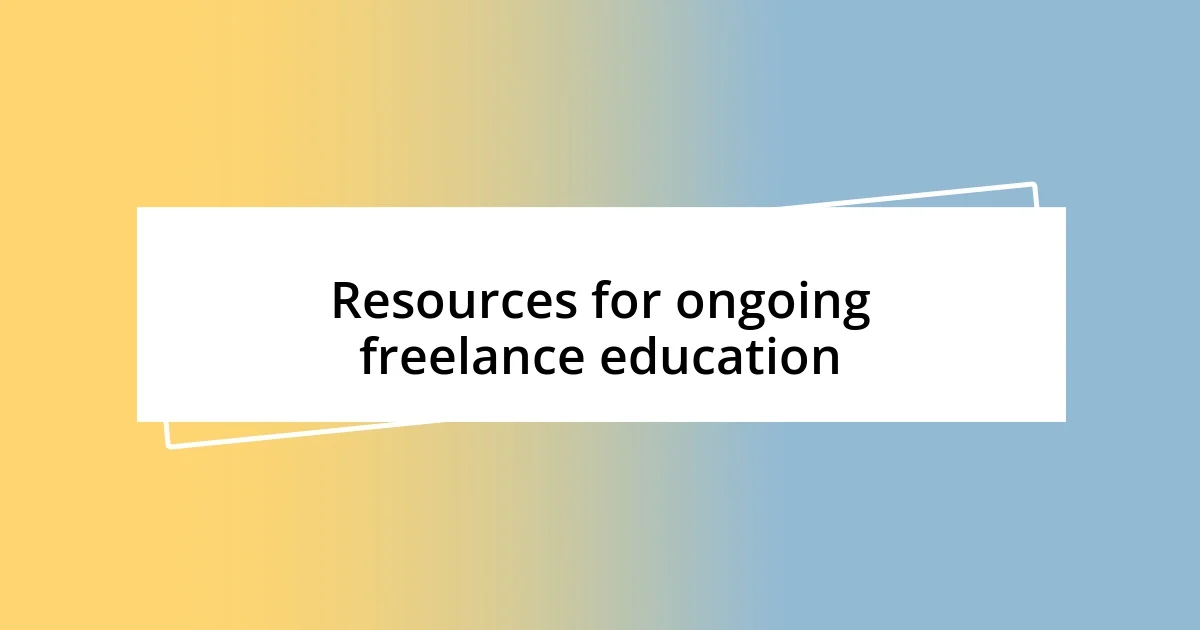
Resources for ongoing freelance education
Finding resources for ongoing freelance education has truly been a game changer for me. I remember when I stumbled upon a community of freelancers online—suddenly, I wasn’t alone in this journey. Have you ever sat at your desk wondering if you were the only one facing certain hurdles? Participating in forums, such as Reddit or dedicated Facebook groups, allowed me to exchange ideas, tools, and tips with fellow freelancers. The sense of belonging and shared knowledge made a huge impact on my growth.
One resource I absolutely swear by are online courses. Platforms like Coursera and Udemy offer a wealth of knowledge tailored for freelancers. I once took a course on negotiation skills that transformed my client conversations. The instructor emphasized role-playing scenarios, which initially felt awkward to practice. But I discovered that practicing conversations in a safe environment made me feel more confident during real discussions. Have you ever wished you could approach negotiations with poise? That course certainly helped me find my voice.
Podcasts have also been a surprising treasure trove of insights for my freelance education. I often listen to industry-related podcasts while I work out or tidy up my space. It keeps my mind engaged while performing mundane tasks, turning them into valuable learning moments. I recall one episode that discussed the importance of personal branding as a freelancer. It opened my eyes to how my unique story could resonate with potential clients. Have you considered how your journey could attract new opportunities? Tuning into these conversations not only educates but also inspires me to weave my narrative seamlessly into my professional life.



